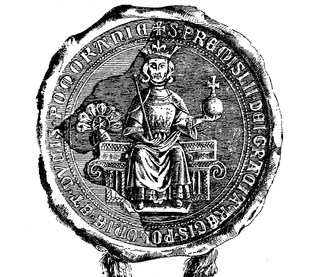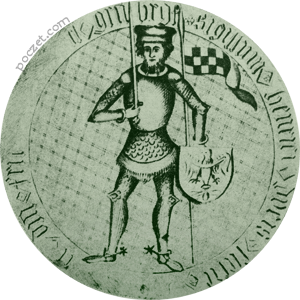Related Research Articles

Wawrzyniec Goślicki was a Polish nobleman, Bishop of Poznań (1601–1607), political thinker and philosopher best known for his book De optimo senatore (1568).

Przemysł II was the Duke of Poznań from 1257–1279, of Greater Poland from 1279 to 1296, of Kraków from 1290 to 1291, and Gdańsk Pomerania (Pomerelia) from 1294 to 1296, and then King of Poland from 1295 until his death. After a long period of Polish high dukes and two nominal kings, he was the first to obtain the hereditary title of king, and thus to return Poland to the rank of kingdom. A member of the Greater Poland branch of the House of Piast as the only son of Duke Przemysł I and the Silesian Princess Elisabeth, he was born posthumously; for this reason he was brought up at the court of his uncle Bolesław the Pious and received his own district to rule, the Duchy of Poznań in 1273. Six years later, after the death of his uncle, he also obtained the Duchy of Kalisz.

Lubusz Land is a historical region and cultural landscape in Poland and Germany on both sides of the Oder river.

Kostrzyn nad Odrą is a town in Gorzów County, Lubusz Voivodeship in western Poland, on the border with Germany.

The Diocese of Lebus is a former diocese of the Catholic Church. It was erected in 1125 and suppressed in 1598. The Bishop of Lebus was also, ex officio, the ruler of a lordship that was coextensive with the territory of the diocese. The geographic remit included areas that are today part of the land of Brandenburg in Germany and the Province of Lubusz in Poland. It included areas on both sides of the Oder River around the town of Lebus. The cathedral was built on the castle hill in Lubusz and was dedicated to St Adalbert of Prague. Later, the seat moved to Górzyca, back to Lebus and finally to Fürstenwalde on the River Spree.

Józef Franczak was a soldier of the Polish Army, Armia Krajowa World War II resistance, and last of the cursed soldiers – members of the militant anti-communist resistance in Poland. He used codenames Lalek, Laluś, Laleczka, Guściowa, and fake name Józef Babiński. He was a resistance fighter for 24 out of 45 years of his life.

The Diocese of Włocławek is a Latin Church ecclesiastical territory or diocese of the Catholic Church in Poland. It is a suffragan in the ecclesiastical province of the Metropolitan Archdiocese of Gniezno. Until the 20th century, it was known as the Diocese of Kujawy.

Adam Stanisław Grabowski, of the Zbiświcz coat-of-arms, was Bishop of Chełmno 1736–39, Bishop of Kujawy 1739–41, Prince-Bishop of Warmia 1741–66.

Henry VIII (VI) the Sparrow was a duke of Żagań–Głogów from 1368 to 1378, after 1378 ruler over Zielona Góra, Szprotawa, Kożuchów, Przemków and Sulechów, and after 1395 ruler over half of Głogów, Ścinawa and Bytom Odrzański.

Głęboczyca massacre was a mass murder of ethnic Poles carried out on 29 August 1943 by the troops of the Ukrainian Insurgent Army aided by the Ukrainian peasants. It exclusively targeted Polish inhabitants of the Głęboczyca colony, located in the Włodzimierz County of the Wołyń Voivodeship in the Second Polish Republic. About 250 Poles were killed, including 199 known by name including women and children. Głęboczyce does not exist anymore. It was swept from existence during the Massacres of Poles in Volhynia and Eastern Galicia, along with the neighbouring settlement of Ostrówek in powiat Luboml.

The Uroczysko Baran killing fields, often referred to in Poland as the "Little Katyn" or the "Second Katyn", was the location for secret executions of soldiers and officers of the Polish Underground State, Home Army, and Second Army of Ludowe Wojsko Polskie carried out by Communist forces on behalf of the NKVD, SMERSH, and PUBP in the later stages of World War II.
Radwan (Radowan) was a bishop of Poznań.

Andrzej Jeż is a Polish Roman Catholic bishop, being the bishop of the Roman Catholic Diocese of Tarnów since 2012. He was previously the auxiliary bishop of Tarnów and titular bishop of Tigillava from 2009 to 2012.
Aneta Katarzyna Stawiszyńska is a Polish historian, regionalist and doctor of humanities.
Ryszard Wołągiewicz was a Polish archaeologist. He was director of National Museum, Szczecin for many years and a well known specialist on the Pre-Roman Iron Age and Roman Iron Age in East-Central Europe.

Klemens Andrzej Bąkiewiczde armis Topór was a bishop-elect of the Diocese of Sandomierz.

Głębokie Lake is a lake in the Lubusz Voivodeship, in the Międzyrzecz County, in the Gmina Międzyrzecz, approximately 5 km north of Międzyrzecz, located in the area of the Lubusz Lakeland and within the drainage basin of the Obra river. It is the largest non-drainage lake in the Lubusz Voivodeship.

Ludwik Bociański was a Polish certified infantry colonel of the Polish Army and the Second Polish Republic's voivode of the Poznań and Vilnius voivodeships.
References
Wałkowski, Andrzej (1995). "Czy w latach 1201–1233 diecezją lubuską rządziło dwóch biskupów o imieniu Wawrzyniec" (PDF). Nadwarciański Rocznik Historyczno-Archiwalny. 2. Retrieved 11 April 2016.